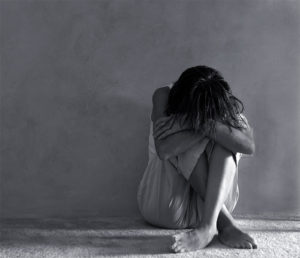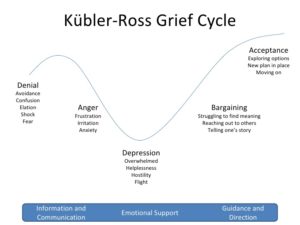
In this lifetime, we are all destined to cope with grief – some people more than others to be fair.
As I write this article, I myself am experiencing grief as I watch my mother slowly pass, primarily of old age and dementia.
It’s been a constant goodbye over several months and my heart aches. I’m just not myself.
I have felt this feeling before, having lost precious loved ones in the past, including my father when I was just 8 years old.
That was by far a huge trauma for me since I was not able to fully understand the emotional aspect of death at the time and I had no knowledge of how to handle the event. Over time, I did grow to understand and find the strength to move on and find purpose once more.
Sadly, no matter how many times I have felt this pain, it does not lessen this pain – right here, right now.
Each situation is raw and new, albeit familiar.
Let’s chat a little more about this.
What is grief?
Grief is a natural response to loss. It’s the emotional suffering you feel when something or someone you love is taken away. Often, the pain of loss can feel overwhelming.
You may experience all kinds of difficult and unexpected emotions, from shock or anger to disbelief, guilt, and profound sadness. The pain of grief can also disrupt your physical health, making it difficult to sleep, eat, or even think straight. These are normal reactions to loss – and the more significant the loss, the more intense your grief will be.
Coping with the loss of someone or something you love is one of life’s biggest challenges. You may associate grieving with the death of a loved one – which is often the cause of the most intense type of grief – but any loss can cause grief, including:
- Divorce or relationship breakup
- Loss of health
- Losing a job
- Loss of financial stability
- A miscarriage
- Retirement
- Death of a pet
- Loss of a cherished dream
- A loved one’s serious illness
- Loss of a friendship
- Loss of safety after a trauma
- Selling the family home
Even subtle losses in life can trigger a sense of grief. For example, you might grieve after moving away from home, graduating from high school, or changing jobs.
Whatever your loss, it’s personal to you, so don’t feel ashamed about how you feel, or believe that it’s somehow only appropriate to grieve for certain things. If the person, animal, relationship, or situation was significant to you, it’s normal to grieve the loss you’re experiencing.
Whatever the cause of your grief, though, there are healthy ways to cope with the pain that, in time, can ease your sadness and help you come to terms with your loss, find new meaning, and eventually move on with your life.
The grieving process
Grieving is a highly individual experience; there’s no right or wrong way to grieve. How you grieve depends on many factors, including your personality and coping style, your life experience, your faith, and how significant the loss was to you.
Inevitably, the grieving process takes time. Healing happens gradually; it can’t be forced or hurried -and there is no “normal” timetable for grieving. Some people start to feel better in weeks or months. For others, the grieving process is measured in years.
Whatever your grief experience, it’s important to be patient with yourself and allow the process to naturally unfold.
How to deal with the grieving process
While grieving a loss is an inevitable part of life, there are ways to help cope with the pain, come to terms with your grief, and eventually, find a way to pick up the pieces and move on with your life.
These include:
- Acknowledge your pain.
- Accept that grief can trigger many different and unexpected emotions.
- Understand that your grieving process will be unique to you.
- Seek out face-to-face support from people who care about you.
- Support yourself emotionally by taking care of yourself physically.
- Recognize the difference between grief and depression.
- The stages of grief
In 1969, psychiatrist Elisabeth Kübler-Ross introduced what became known as the “five stages of grief.” I read her book, “On Death & Dying”, as a teenager and it helped me to understand what I was coping with even years after my father had passed.
These stages of grief were based on her studies of the feelings of patients facing terminal illness, but many people have generalized them to other types of negative life changes and losses, such as the death of a loved one or a break-up.
The five stages of grief are:
DENIAL: “This can’t be happening to me.”
ANGER: “Why is this happening? Who is to blame?”
BARGAINING: “Make this not happen, and in return, I will ____.”
DEPRESSION: “I’m too sad to do anything.”
ACCEPTANCE: “I’m at peace with what happened.”

If you are experiencing any of these emotions following a loss, it may help to know that your reaction is natural and that you’ll heal in time. However, not everyone who grieves goes through all of these stages – and that’s okay.
Contrary to popular belief, you do not have to go through each stage in order to heal. In fact, some people resolve their grief without going through any of these stages.
Grief can be a roller coaster
Instead of a series of stages, we might also think of the grieving process as a roller coaster, full of ups and downs, highs and lows. Like many roller coasters, the ride tends to be rougher in the beginning, the lows may be deeper and longer. The difficult periods should become less intense and shorter as time goes by, but it takes time to work through a loss. Even years after a loss, especially at special events such as a family wedding, the birth of a child, or Christmas we may still experience a strong sense of grief.
Symptoms of grief
While loss affects people in different ways, many of us experience the following symptoms when we’re grieving. Just remember that almost anything that you experience in the early stages of grief is normal – including feeling like you’re going crazy, feeling like you’re in a bad dream, or questioning your religious or spiritual beliefs.
Emotional Symptoms
- Shock and disbelief.
Right after a loss, it can be hard to accept what happened. You may feel numb, have trouble believing that the loss really happened, or even deny the truth. If someone you love has died, you may keep expecting them to show up, even though you know they’re gone.
2. Sadness.
Profound sadness is probably the most universally experienced symptom of grief. You may have feelings of emptiness, despair, yearning, or deep loneliness. You may also cry a lot or feel emotionally unstable.
3. Guilt.
You may regret or feel guilty about things you did or didn’t say or do. You may also feel guilty about certain feelings (e.g. feeling relieved when the person died after a long, difficult illness). After a death, you may even feel guilty for not doing something to prevent the death, even if there was nothing more you could have done.
4. Anger.
Even if the loss was nobody’s fault, you may feel angry and resentful. If you lost a loved one, you may be angry with yourself, God, the doctors, or even the person who died for abandoning you. You may feel the need to blame someone for the injustice that was done to you.
5. Fear.
A significant loss can trigger a host of worries and fears. You may feel anxious, helpless, or insecure. You may even have panic attacks. The death of a loved one can trigger fears about your own mortality, of facing life without that person, or the responsibilities you now face alone.
Physical Symptoms
We often think of grief as a strictly emotional process, but grief often involves physical problems, including:
- Fatigue
- Nausea
- Poor digestion
- Lowered immunity
- Weight loss or weight gain
- Aches and pains
- Insomnia
Seek support for grief and loss
The pain of grief can often cause you to want to withdraw from others and retreat into your shell. But having the face-to-face support of other people is vital to healing from loss. Even if you’re not comfortable talking about your feelings under normal circumstances, it’s important to express them when you’re grieving.
While sharing your loss can make the burden of grief easier to carry, that doesn’t mean that every time you interact with friends and family, you need to talk about your loss. Comfort can also come from just being around others who care about you. The key is not to isolate yourself.
Turn to friends and family members. Now is the time to lean on the people who care about you, even if you take pride in being strong and self-sufficient. Rather than avoiding them, draw friends and loved ones close, spend time together face to face, and accept the assistance that’s offered. Often, people want to help but don’t know how, so tell them what you need – whether it’s a shoulder to cry on, help with funeral arrangements, or just someone to hang out with.
Accept that many people feel awkward when trying to comfort someone who’s grieving. Grief can be a confusing, sometimes frightening emotion for many people, especially if they haven’t experienced a similar loss themselves. They may feel unsure about how to comfort you and end up saying or doing the wrong things. But don’t use that as an excuse to retreat into your shell and avoid social contact. If a friend or loved one reaches out to you, it’s because they care.
Draw comfort from your faith. If you follow a religious tradition, embrace the comfort its mourning rituals can provide. Spiritual activities that are meaningful to you – such as praying, meditating, or going to church – can offer solace.
Talk to a therapist or grief counsellor. If your grief feels like too much to bear, find a mental health professional with experience in grief counselling. An experienced therapist can help you work through intense emotions and overcome obstacles to your grieving.
Take care of yourself as you grieve
When you’re grieving, it’s more important than ever to take care of yourself. The stress of a major loss can quickly deplete your energy and emotional reserves. Looking after your physical and emotional needs will help you get through this difficult time.
- Face your feelings.
You can try to suppress your grief, but you can’t avoid it forever. In order to heal, you have to acknowledge the pain. Trying to avoid feelings of sadness and loss only prolongs the grieving process. Unresolved grief can also lead to complications such as depression, anxiety, substance abuse, and health problems.
2. Express your feelings in a tangible or creative way.
Write about your loss in a journal. If you’ve lost a loved one, write a letter saying the things you never got to say; make a scrapbook or photo album celebrating the person’s life; or get involved in a cause or organization that was important to your loved one.
3. Try to maintain your hobbies and interests.
There’s comfort in routine and getting back to the activities that bring you joy and connect you closer to others can help you come to terms with your loss and aid the grieving process.
4. Don’t let anyone tell you how to feel, and don’t tell yourself how to feel either.
Your grief is your own, and no one else can tell you when it’s time to “move on” or “get over it.” Let yourself feel whatever you feel without embarrassment or judgment.
It’s okay to be angry, to yell at the heavens, to cry or not to cry. It’s also okay to laugh, to find moments of joy, and to let go when you’re ready.
5. Plan ahead for grief “triggers.”
Anniversaries, festive holidays, and milestones can reawaken memories and feelings. Be prepared for an emotional overload, and know that it’s completely normal. If you’re sharing a festive holiday or lifecycle event with other relatives, talk to them ahead of time about their expectations and agree on strategies to honour the person you loved.
6. Look after your physical health.
The mind and body are connected. When you feel healthy physically, you’ll be better able to cope emotionally. Combat stress and fatigue by getting enough sleep, eating right, and exercising. Don’t use alcohol or drugs to numb the pain of grief or lift your mood artificially.
When to seek professional help for grief
If you’re experiencing symptoms of complicated grief or clinical depression, talk to a mental health professional right away. Left untreated, complicated grief and depression can lead to significant emotional damage, life-threatening health problems, and even suicide. But treatment can help you get better.
- Contact a grief counsellor or professional therapist if you:
- Feel like life isn’t worth living
- Wish you had died with your loved one
- Blame yourself for the loss or for failing to prevent it
- Feel numb and disconnected from others for more than a few weeks
- Are having difficulty trusting others since your loss
- Are unable to perform your normal daily activities
It is my sincere wish for you all as you face the challenges that this life delivers that you find strength and courage to rise up and be brave.
Life is precious.
**If you’ve got this far – thank you for reading and I look forward to bringing you more information in the future.
Now, enjoy some music to soothe your soul …
